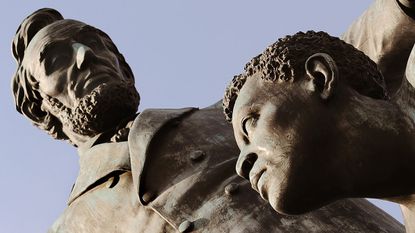The legacy of slavery: three challenges for the US
America is once again going through a period of soul-searching, 150 years after abolition of slavery

This week marks the 150th anniversary of the 13th amendment to the US constitution, which abolished slavery in all American states when it was ratified in December 1865.
But now, seven years after electing its first black president, America is once again going through a period of soul-searching – and one of the most difficult periods of racial tension in a generation. Even as it looks back on a century and a half of progress, new challenges lie ahead:
National security policy
Subscribe to The Week
Escape your echo chamber. Get the facts behind the news, plus analysis from multiple perspectives.

Sign up for The Week's Free Newsletters
From our morning news briefing to a weekly Good News Newsletter, get the best of The Week delivered directly to your inbox.
From our morning news briefing to a weekly Good News Newsletter, get the best of The Week delivered directly to your inbox.
With the man who could be its next president – Donald Trump – accused of inciting racial hatred with a call to ban all Muslims from entering the country, much is made of the psyche of some sections of American society, which is propelling his advance. The Guardian's Jason Burke says Trump's words "fit into a clear historic pattern" of western perceptions of Islam and Muslims. "History teaches us that the resultant hateful rhetoric will eventually pass but, depressingly, the timescale is decades, even centuries, rather than months," says Burke.
Tensions in education
Students at Princeton University are at the centre of protests demanding that the university dissociates itself from former US president Woodrow Wilson, due to his "racist legacy". That follows unrest at Yale, Dartmouth and other campuses following an incident at the University of Missouri, in which the president and chancellor tendered their resignations after accusations that they responded improperly to accusations of racism on their campus. "The anguished public meetings that spread from college to college through November highlighted previously undisclosed feelings of suffering and outrage among black and other minority students in the US," reports The Independent. "It is the latest twist in the unresolved story of racism in America."
Police shootings
The killings of African-American men by white police officers in recent years have raised deep questions about ingrained attitudes among America's law enforcement. In the latest incident, a video emerged three weeks ago of a white Chicago police officer shooting a black teenager 16 times in 2014. It followed several other similar incidents. "2016 will mark the first year the federal government will implement a reasonable attempt at counting the number of people who die at the hands of law enforcement throughout the US," reports The Guardian.
Create an account with the same email registered to your subscription to unlock access.
Sign up for Today's Best Articles in your inbox
A free daily email with the biggest news stories of the day – and the best features from TheWeek.com
-
 Antony Gormley's Time Horizon – a 'judgmental army' of 100 cast-iron men
Antony Gormley's Time Horizon – a 'judgmental army' of 100 cast-iron menThe Week Recommends Sculptures are 'everymen questioning the privilege of their surroundings' at the Norfolk stately home
By Adrienne Wyper, The Week UK Published
-
 'King's horses take free rein through London'
'King's horses take free rein through London'Today's Newspapers A roundup of the headlines from the US front pages
By The Week Staff Published
-
 Is pop music now too reliant on gossip?
Is pop music now too reliant on gossip?Talking Point Taylor Swift's new album has prompted a flurry of speculation over who she is referring to in her songs
By Richard Windsor, The Week UK Published
-
 Flies attack Donald Trump
Flies attack Donald TrumpTall Tales And other stories from the stranger side of life
By Chas Newkey-Burden, The Week UK Published
-
 Donald Trump criminal charges for 6 January could strain 2024 candidacy
Donald Trump criminal charges for 6 January could strain 2024 candidacySpeed Read Former president’s ‘pettifoggery’ won’t work well at trial, said analyst
By Chas Newkey-Burden Published
-
 Donald Trump in the dock: a fraught moment for US democracy
Donald Trump in the dock: a fraught moment for US democracyTalking Point There is speculation that former president could end up running his 2024 election campaign from behind bars
By The Week Staff Published
-
 Donald Trump indicted again: is latest threat of prison a game changer?
Donald Trump indicted again: is latest threat of prison a game changer?Today's Big Question The former president ‘really could be going to jail’ but Republicans ‘may not care’ say commentators
By Chas Newkey-Burden Published
-
 Trump told he could face charges over classified Mar-a-Lago documents
Trump told he could face charges over classified Mar-a-Lago documentsSpeed Read A second criminal indictment is on the cards for the former US president and current Republican frontrunner
By Sorcha Bradley Published
-
 George Floyd legacy: what has changed in the US three years on
George Floyd legacy: what has changed in the US three years onfeature Police officers are more accountable but has ‘white empathy’ hit a wall?
By Chas Newkey-Burden Published
-
 The return of Donald Trump to prime-time television
The return of Donald Trump to prime-time televisionfeature CNN executives have been condemned over the former president’s televised town hall
By The Week Staff Published
-
 Durham criticizes FBI, offers little new in final report on 4-year Trump-Russia investigation review
Durham criticizes FBI, offers little new in final report on 4-year Trump-Russia investigation reviewSpeed Read
By Peter Weber Published